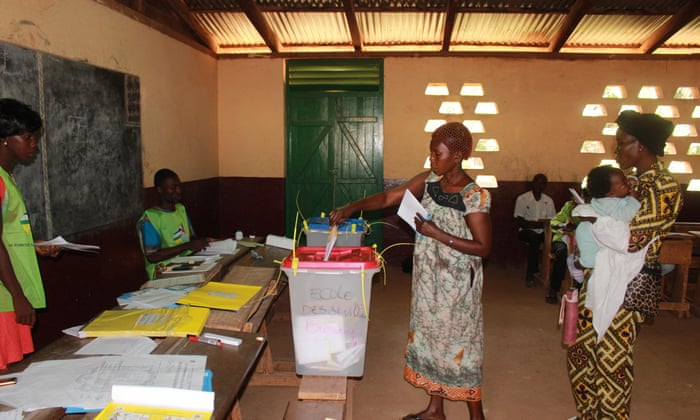Central African Republic candidates call for halt to 'tainted' election
Joint statement by two thirds of presidential contenders alleges irregularities and intimidation in first round of voting

A woman casts her ballot at a polling station in Bangui, Central African Republic, on 30 December in the first round of presidential and legislative elections. Photograph: Xinhua/Corbis
Twenty out of the 30 candidates vying to be president of Central African Republichave demanded the election be scrapped after what they said was a tainted first round of voting.
In a joint statement on Monday, the dissenters cited what they described as irregularities and intimidation in balloting on 30 December, partial results of which have been published.
They said they refused to be “complicit in this electoral masquerade” and called for the whole process to be “purely and simply stopped”.
They invited all players to get around the negotiating table “to draw up ways of safeguarding the nation”.
Signatories include heavyweight candidate Karim Meckassoua , a former foreign minister from the minority Muslim community, who had been a pre-election frontrunner.
Independent candidate Faustin-Archange Touad éra , a former prime minister, has taken a commanding lead in the presidential race, garnering more than 23% of the vote with a quarter of the ballots counted, electoral officials said on Sunday. The former maths professor had been considered an outsider.
Anicet-Georges Dologuélé , also a former prime minister, was in second place with Desire Kolingba, son of a former president, in third.
A likely second round is set for 31 January.
The election is seen as vital to restoring stability in the former French colony after years of unrest.
About 2 million voters were eligible to cast their ballots for a new president and members of the 105-seat parliament.
Voting passed without major incident and was hailed as a success by the international community.
One of the world’s poorest countries, with a history of coups and rebellions, the Central African Republic was plunged into fierce sectarian unrest in 2013 after longtime leader François Bozizé was ousted by a mainly Muslim rebel alliance.
Thousands of people were killed and about one in 10 fled their homes in attacks by rogue rebels on remote villages and brutal reprisals by Christian militia against Muslim communities.
UN and French peacekeepers helped restore a degree of calm in January 2014, when a transitional government took over, but large parts of the country remain lawless.
